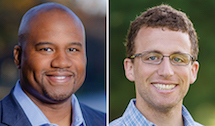Everyone knows that social media has made an indelible impact on the 2016 election cycle. But can it be used to predict elections?
Chicago-based software giant Cision recently utilized social monitoring tools as a means of predicting the Super Tuesday races. Conducting analytical polls that monitor online social conversations, the PR software company was able to produce voter forecast percentages in each of the 11 states participating in tomorrow’s crucial Super Tuesday presidential primary race.
Cision’s predictive analysis consisted of a collection of more than 10 million social conversations, replies and retweets from residents in a dozen states between February 20 and February 24. Messages were filtered to exclude those originating from underage voters or mainstream media sources, and were further refined to focus on mentions of specific candidates, including campaign hashtags and candidate slogans, in order to spotlight the candidates receiving the highest levels of positive engagement. The analysis includes data from Twitter, YouTube, online forums and Facebook fan pages.
"Social mention analysis allows parties or brands to use people's own words to help develop effective strategies to engage with them," Cision content marketing and social media manager James Rubec told O'Dwyer's. "If people will tweet about a candidate, they are more likely to attend an event in support of them. If they'll attend an event, they are more likely to vote. Social media engagement is a strong indicator of intention to take action and smart candidates should be measuring that."
Cision had previously predicted the winners for both the Iowa Republican Caucus (Ted Cruz) and the New Hampshire Democratic and Republican Party primaries (Bernie Sanders and Donald Trump, respectively), based on an analysis of Twitter conversation percentages among IA and NH voters. Cision also accurately predicted that Trump would win the February 20 South Carolina Republican primary, based on the fact that he accounted for 40 percent of the GOP voice percentage occurring in that state. The methodology, however, incorrectly predicted that Sanders would win the Nevada Democratic Caucus, where he accounted for 53 percent of the Democratic share of the voice in that state. Clinton on February 20 earned a decisive win in the Nevada caucuses, with 52.6 percent of the vote.
Rubec told O'Dwyer's that social analysis has shown online momentum recently shifting from Sanders to Clinton.
"Just a month ago Sanders' share of voice on social across the country was between 10 percent and 20 percent higher than Clinton's. While more people are promoting Sander's popular hashtag #FeelTheBern than Clinton's #ImWithHer, fewer social media commentators engage in discussions about Sanders' policy proposals than Clinton's in all but four Super Tuesday States," Rubec said.
Cision's percentage predictions for Super Tuesday are as follows:
Democratic Party races:
- Alabama: Clinton 53%, Sanders 47%
- Arkansas: Clinton 52%, Sanders 48%
- Colorado: Sanders 51%, Clinton 49%
- Georgia: Clinton 52%, Sanders 48%
- Massachusetts: Sanders 53%, Clinton 47%
- Minnesota: Clinton 52%, Sanders 48%
- Oklahoma: Clinton 54%, Sanders 46%
- Tennessee: Clinton 51%, Sanders 49%
- Texas: Clinton 53%, Sanders 47%
- Vermont: Sanders 60%, Clinton 40%
- Virginia: Sanders 52%, Clinton 48%
Republican Party races:
- Alabama: Trump 42%, Cruz 29%, Rubio 17%
- Alaska: Trump 35%, Cruz 24%, Rubio 19%
- Arkansas: Trump 37%, Rubio 27%, Cruz 27%
- Georgia: Trump 36%, Cruz 23%, Rubio 22%
- Massachusetts: Trump 31%, Rubio 23%, Cruz 21%
- Minnesota: Trump 29%, Rubio 25%, Cruz 25%
- Oklahoma: Trump 31%, Cruz 24%, Rubio 23%
- Tennessee: Trump 34%, Rubio 26%, Cruz 24%
- Texas: Cruz 31%, Trump 29%, Rubio 21%
- Vermont: Trump 30%, Rubio 23%, Cruz 22%
- Virginia: Trump 54%, Rubio 18%, Cruz 17%


 Measuring the success of an effective PR campaign isn’t just essential for marketing managers, but valuable for other departments within an organization as well. Here are three insightful PR metrics needed to easily track PR campaign success.
Measuring the success of an effective PR campaign isn’t just essential for marketing managers, but valuable for other departments within an organization as well. Here are three insightful PR metrics needed to easily track PR campaign success. The COVID-19 pandemic isn't just affecting poll results—it's impacting the practice of survey research itself.
The COVID-19 pandemic isn't just affecting poll results—it's impacting the practice of survey research itself. Clients often want press—even if it’s not the right press. PR professionals must have the ethics and wisdom to help clients get value-based placements, not placements that simply look good.
Clients often want press—even if it’s not the right press. PR professionals must have the ethics and wisdom to help clients get value-based placements, not placements that simply look good. Add these seven digital metrics to your existing earned media coverage toolkit to capture better data and provide the insights that truly matter.
Add these seven digital metrics to your existing earned media coverage toolkit to capture better data and provide the insights that truly matter. A list of some of best PR tools on the market today that can improve your remote work operations and help you thrive during the COVID-19 crisis.
A list of some of best PR tools on the market today that can improve your remote work operations and help you thrive during the COVID-19 crisis.


 Have a comment? Send it to
Have a comment? Send it to 
No comments have been submitted for this story yet.